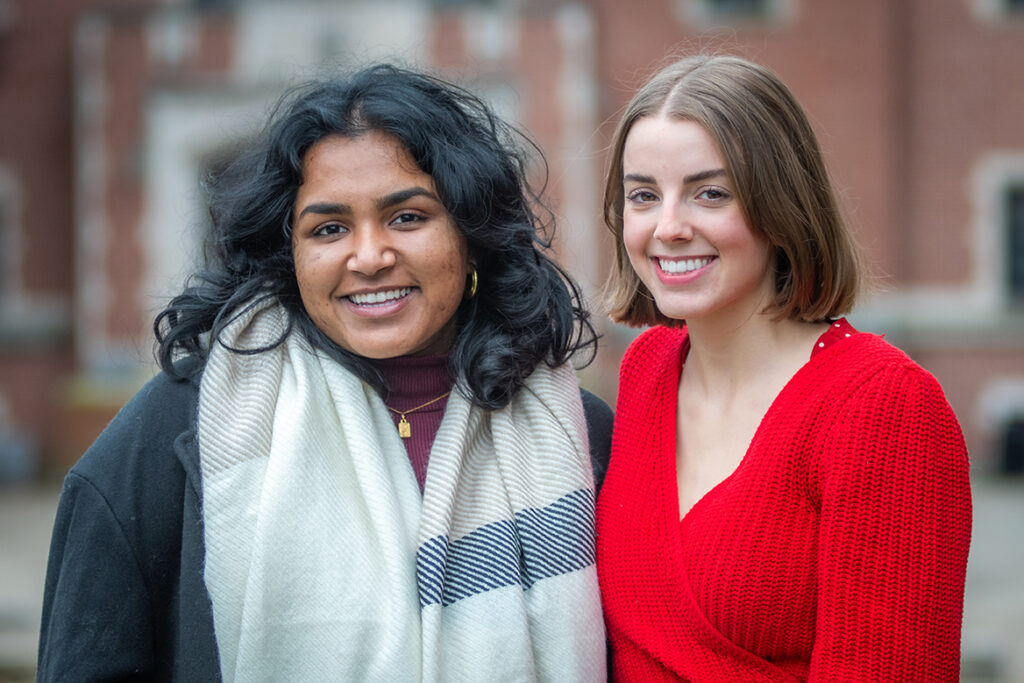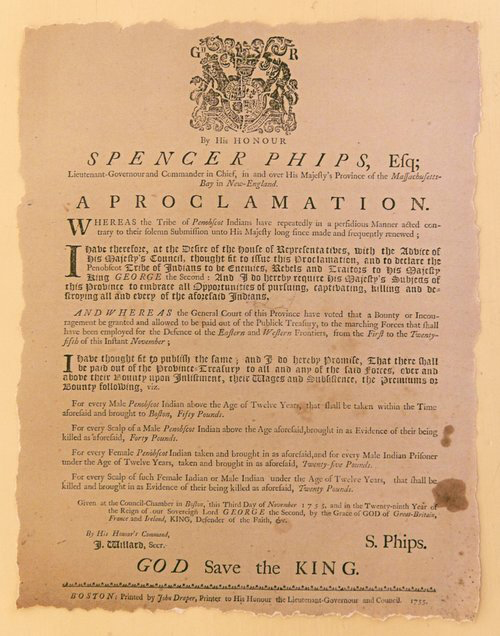Students work to amplify plight of Penobscot Tribe in colonial Massachusetts

In 1755, Spencer Phips, lieutenant governor of the Massachusetts Bay colony, issued a proclamation that declared the Penobscot people enemies, rebels, and traitors to King George II, and called on all “his Majesty’s Subjects of this Province to Embrace all opportunities of pursuing, captivating, killing, and Destroying all and every of the aforesaid Indians.” The colonial government promised to pay a bounty for every Penobscot captured (or killed) and brought to Boston.
During an internship with the Boston-based nonprofit Upstander Project, Lamisa Muksitu ‘22 and Penelope Kogan ’22 — both of whom concentrate in Holocaust and genocide studies — helped prepare a teacher’s guide to accompany “Bounty,” a short documentary film that focuses on the plight of the Penobscot people after the government offered a reward for their scalps or bodies.
Under the joint mentorship of Mishy Lesser, learning director of the Upstander Project, and Professor Shelly Tenenbaum, coordinator of undergraduate activities for the Strassler Center for Holocaust and Genocide Studies, Muksitu and Kogan researched and edited supporting documents to help create a guide that educators, students, and the general public can use to deepen their understanding of the issues raised in the film.

“Lamisa and Penelope were exceptionally motivated to assist with this task,” wrote Lesser. “They watched, and then we discussed, a rough cut of ‘Bounty.’ Together, we unpacked the message of the film in light of the U.N. Convention on the Prevention and Punishment of the Crime of Genocide, and we talked about different ways this material could be taught to a variety of grade levels.”
Muksitu said her work on “Bounty” strengthened her desire to pursue research as a future career path, the field “still has a long way to go in terms of inclusivity and accessibility.”
“While I have a deep attachment to academia, I believe that academia must be reconstructed to make well-deserved space for indigenous people and people of color,” she wrote. Muksitu also said projects like the one she worked on “serve as important first steps.”
For Kogan, who is majoring in https://www.clarku.edu/academics/undergraduate/programs/doctorate/psychology/ with a minor in international development and social change, working on the project reemphasized the importance of historical context when studying areas of conflict.
Kogan wrote that her internship at the Upstander Project not only taught her “how to dig deep within a history” but also “to look for stories of resistance — even into the present day.” She plans to pursue her master’s in international development and social change after earning her bachelor’s in political science, with a minor in English, in the spring.
“I am impressed by Lamisa and Penelope’s emphasis on unlearning and relearning Native American history,” wrote Professor Tenenbaum. “Because of their efforts, students will benefit from this powerful teaching tool by gaining a deeper understanding of genocide perpetrated against indigenous peoples.”
Muksitu and Kogan’s internships were funded through CHGS by the Doris Tager Summer Stipend Fund and the Ina R. and Haskell R. Gordon Fund, respectively. The students presented their research at Fall Fest, and joined Lesser on November 10 for “Indian Scalps for Money: A Hidden History of Colonial Times,” a presentation that was part of the HGS Especially for Students Lecture Series and co-sponsored by the Comparative Race and Ethnic Studies program, the Education Department, and the Office of Diversity and Inclusion.


